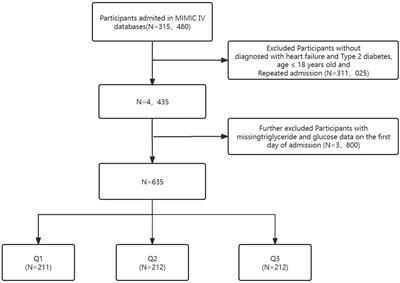Association between the triglyceride glucose index and length of hospital stay in patients with heart failure and type 2 diabetes in the intensive care unit: a retrospective cohort study
Background: The coexistence of heart failure and diabetes is prevalent, particularly in Intensive Care Units (ICU).

However, the relationship between the triglyceride-glucose (TyG) index, heart failure, diabetes, and the length of hospital stay (LHS) in patients with cerebrovascular disease in the ICU remains uncertain. This study aims to investigate the association between the TyG index and LHS in patients with heart failure and diabetes. Methods: This retrospective study utilized the Medical Information Mart for Intensive Care (MIMIC)-IV database to analyze patients with diabetes and heart failure. Participants were categorized into quartiles based on the TyG index, and the primary outcome was LHS.
The association between the TyG index at ICU admission and LHS was examined through multivariable logistic regression models, restricted cubic spline regression, and subgroup analysis. Results: The study included 635 patients with concurrent diabetes and heart failure.
The fully adjusted model demonstrated a positive association between the TyG index and LHS. As a tertile variable (Q2 and Q3 vs Q1), the beta (β) values were 0.88 and 2.04, with a 95% confidence interval (95%CI) of -0.68 to 2.44 and 0.33 to 3.74, respectively. As a continuous variable, per 1 unit increment, the β (95% CI) was 1.13 (0.18 to 2.08).
The TyG index’s relationship with LHS showed linearity (non-linear p = 0.751). Stratified analyses further confirmed the robustness of this correlation. Conclusion: The TyG index exhibited a linearly positive association with the LHS in patients with both heart failure and diabetes. Nevertheless, prospective, randomized, controlled studies are imperative to substantiate and validate the findings presented in this investigation.
Read the full article at the original website
References:
